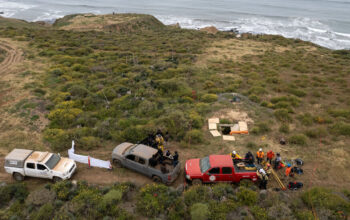
SULAIMANIYA, Iraq — Iran launched ballistic missile and drone attacks across the border at Kurdish Iranian opposition bases in Iraq on Monday, killing at least two people and wounding eight others after what an Iranian official said were repeated warnings to Iraq to expel the groups.
Iran’s semiofficial Fars news agency said on Monday that the security forces had targeted “terrorist groups” with missiles and drones, and an Iranian commander listed towns and villages they planned to attack next.
Iran blames the groups for fueling protests that have swept Iran since the September death of a young Kurdish-Iranian woman who was in custody in Iran after being accused of violating the law on head scarves.
The Kurdistan Democratic Party of Iran said two of its members were killed and eight wounded when its main base near the city of Koya, in Iraq’s semiautonomous Kurdistan Region, was hit by Iranian Fateh-110 ballistic missiles, according to the deputy head of the party, Amanj Zebaii. He said five smaller mountain bases of the group in the Sidakan area were also hit.
The director of Koya’s main hospital, Sherwan Jalal, said ambulances had been prevented from immediately going to the site of the attacks because of the continued danger of airstrikes. He confirmed that two people had died and that eight were wounded and said Koya residents were arriving to donate blood for the injured.
More on the Protests in Iran
Another major opposition group, Komala, the Iranian Kurdish Communist Party, said its base near Sulaimaniya also came under attack Monday morning but the group did not sustain casualties. A Komala official, Navid Mehrawar, said the base was targeted with five suicide drones.
The Kurdish media posted videos of air-raid sirens sounding from the U.S. consulate in the center of the Kurdish capital, Erbil. In the city of Sulaimaniya, the Kurdistan Region’s second largest, residents of a neighborhood accused by Iranian officials of harboring opposition figures said Iranian surveillance drones flew overhead.
The attacks on Monday were the first since several days of Iranian strikes at the end of September killed 18 people, including a pregnant woman, and injured nearly 60 at and around opposition bases across the region, according to Kurdish health ministry officials.
Iranian refugees, including women and children, were among the casualties, according to the U.N. refugee agency. One strike destroyed a refugee agency school.
The Fars news agency quoted a commander of the Iranian Republican Guard Corps, Brig. Gen. Mohammad Pakpour, as saying Iran had demanded in multiple meetings with Iraqi and Kurdish officials that the opposition fighters be expelled or disarmed.
“However this did not happen,” he said. “We will not ignore this and we will target these headquarters wherever they are.”
Commander Pakpour, without proof, blamed opposition groups in Iraq’s Kurdistan Region for assassinations in mostly Kurdish provinces and said most protesters arrested were from opposition groups based across the border. He listed nine other towns, neighborhoods and areas in the region that he said Iran planned to target next if residents there did not expel opposition members.
Commander Pakpour referred to the opposition groups as separatists. But the groups targeted have made clear that they see an independent Kurdish state as a cherished but unattainable dream and that they are dedicated to strengthening Kurdish rights within a federated, democratic Iran. The groups targeted said they did not launch attacks inside Iran.
Iraq’s foreign minister, Fuad Hussein, described the attacks as a dangerous and unjustified “hostile escalation” and said he had delivered that message to the Iranian foreign minister on Monday. Mr. Hussein called the attacks a blatant violation of Iraqi sovereignty. The country’s Foreign Ministry said Iraq planned high-level diplomatic measures in response.
Iraq’s new prime minister, Mohammed Shia al-Sudani, told reporters in Baghdad on Saturday that the leadership of the Kurdistan Region, which is semiautonomous, had refused the disarmament demand.
Several armed Iranian Kurdish opposition groups have maintained bases for years near the border in neighboring Iraq. They say their weapons — mostly rifles and rocket-propelled grenades — are for self-defense and to help defend the Iraqi border.
One of the groups, P.A.K., was part of the U.S.-backed coalition of Kurdish fighters battling the Islamic State after its takeover of parts of northern Iraq in 2014.

